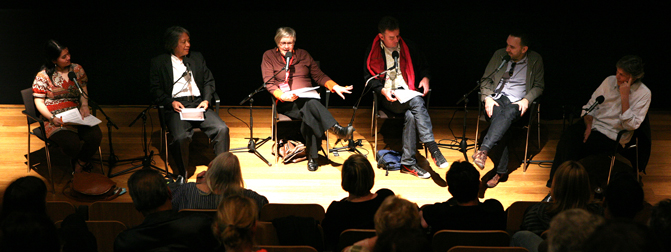In the final two days of the festival, I managed to cram in something entirely trivial—“Dead Snow”—and some discussions about extremely serious filmmaking from and about the South-east Asian region.
But first, dinner at Jimmy’s on the Mall on Saturday night, and some very interesting conversation; from Jeffrey Roth speaking with my sister and me about his experiences being first in to record the collective experiences of the first men to walk on the moon as he made—“The Wonder of It All”—and to then be pipped at the post by the people who made “In the Shadow of the Moon”; to the avuncular, and frighteningly tall Dennis Tupicoff, born and raised in Brisbane, and one of the many creative types who joined the artistic brain-drain fleeing the repressive rule of Joh Bjelke-Petersen in the seventies and eighties. Dennis was in town for a retrospective about his considerable body of work in the field of animation, and what a gentle, charming giant of a man he is.
I snuck away from dinner with my terrified sister and a group of friends to the guilty pleasure of “Dead Snow”—zombie Nazis terrorise a group of young skiers in the Norwegian Alps… how could you go wrong? And there was an Asian-Pacific connection, as festival programming manager Alex Fischer proudly pointed out—the film was made by a few graduates of Bond University’s film production course. And evidently—much to the delight of a very excited audience—there is a lot more bizarre stuff where “Dead Snow” came from, for Tommy Wirkola and his messed-up mates are full of perverted ideas.
Sunday morning saw a quick diversion into Radio National’s recording of “Indonesia Calling Seminar” chaired by Movie Time’s Julie Rigg, and Australia Talks Movies’ Paul Barclay, who invited John Hughes “Indonesia Calling: Joris Ivens in Australia”, Gotot Prakosa “Kantata Takwa”, and Robert Connolly “Balibo” to speak about their films. And the discussion was passionate and very revealing about the ways in which filmmaking in our local region has had an influence well beyond its borders. Prakosa spoke of his collaboration with singer Iwan Fals and revered poet W.S. Rendra and other artists who contributed hugely to making Indonesia the progressive country we know today. Sadly, W.S. Rendra died late last week, and Julie Rigg was on the ball enough to have a compelling clip of his work on hand to show us. Hughes also offered a shy account of his creative process in exploring the groundbreaking work of Joris Ivens, and worried several times—needlessly—that he might not have been making his point clearly.
And just as fascinating was Robert Connolly in his revelations about the constantly evolving process of making his film “Balibo”, ostensibly a story about the deaths of six journalists in the lead-up to Indonesia’s invasion of East Timor in late-1975. Like the film’s themes of shifting agendas on the parts of journalists, terrified locals, and emerging politicians like now President Jose Ramos Horta, “Balibo” began as a simple exploration of murdered Australians, and morphed into a very important cultural document charting the death of a colony, and the tragic and uplifting birth pangs of a new nation. Alongside the experiences of Prakosa and Hughes, this was powerful stuff, and all the more noteworthy for the fact that within hours, Connolly was proudly and humbly the subject of accolades for his film: The FIPRESCI and Interfaith Awards.
Snuck that one up on you, didn’t I? Well, more about that and the FIPRESCI films tomorrow in my festival wrap-up!
On BIFFs closing day, the Indonesia Calling seminar focussed on three films in the program that deal with significant moments in Indonesia’s history: its colonisation (Indonesia Calling: Joris Ivens in Australia); its international politics during the Suharto regime (Kantata Takwa); and its occupation of East Timor (Balibo). The seminar brought together the three filmmakers – Robert Connolly, John Hughes and APSA Academy member Gotot Prakosa – to discuss politics and personal choices in these historical representations of Indonesia on film. You can listen live or download the podcast here: http://www.abc.net.au/rn/movietime/features/miff/.

Indonesia Calling Seminar: Patricia Laksmono (Asia Pacific Screen Awards), Gotot Prakosa (Producer, Director,
Screenwriter, APSA Academy Member), Julie Rigg (Movie Time, ABC Radio National), Paul Barclay (Australia Talks
Movies, ABC Radio National), Robert Connolly (Director), John Hughes (Director and Producer).
Photo by Jimmy Malecki.
